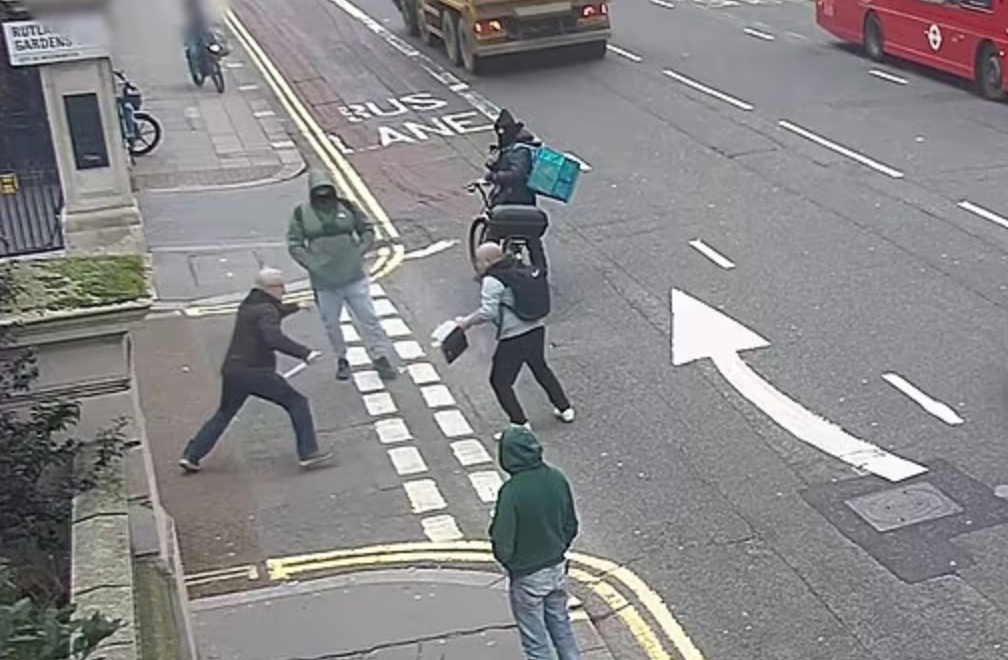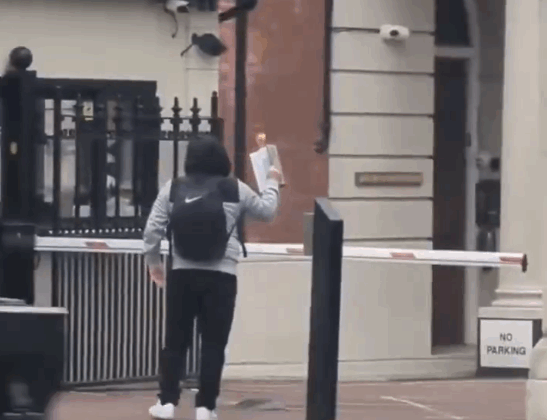“You were clearly deeply offended.”
On the heels of the UK recognizing an Islamic terrorist state in Israel, police arrested the third known person for criticising Hamas and released a Muslim man who had gone on a stabbing spree after he saw a Koran being burned. Or as the judge in the case put it, “the holy Koran.”
Who is the Koran holy to? The political and judicial systems of the United Kingdom which have effectively enacted Islamic Sharia blasphemy law by selectively prosecuting those who offend Islam. But not those who offend the religious sensibilities of Christians or Jews. Do whatever you like with a cross or a bible, but touch a Koran and you’re not only under arrest.
You’re also fair game for a stabbing.
Hamit Coskun, a half-Armenian and half-Kurdish gentleman, both of whose halves have suffered from genocide under Turkish Islamist rule, decided to protest by burning a copy of the Koran outside the Turkish consulate in London while shouting “Islam is religion of terrorism”.
Moussa Kadri set out to prove him right by fetching a knife and stabbing at him while shouting, “I’m going to kill you”. The Muslim terrorist explained to the police that he was just out to “protect my religion” in the traditional Islamic fashion through violence.
And the British authorities were typically understanding of Muslim violence against non-Muslims.
Moussa Kadrhas, the Muslim stabber, was freed on bail, while Hamit Coskun, the non-violent non-Muslim stabber, was kept locked up. In the UK, being stabbed by a Muslim is considered a more serious sign of guilt than the actual stabbing. And the authorities were much more worried about Coskun, a self-proclaimed “atheist” and “critic of Islam” on the loose, than just another one of the thousands of Muslim terrorists who are already freely running around the country.
The stabbing victim was charged with the unique crime of “having intent to cause against the religious institution of Islam”. This had not previously been a crime in any non-Muslim country, but with a Muslim ‘justice minister’ enforcing Islamic law, that may no longer be an accurate description of the United Kingdom anyway.
When the case came before the court of justice, District Judge John McGarva denounced Hamit Coskun for his “highly provocative” behavior. “Your actions in burning the Quran where you did were highly provocative, and your actions were accompanied by bad language in some cases directed toward the religion and were motivated at least in part by hatred of followers of the religion.”
The Muslim stabber’s trial however was far more leniently handled.
Even though Moussa had allegedly shouted “I’m going to kill you” while stabbing at another human being (or at least a human being), he was only charged with possession of a knife and common assault, not attempted murder. The authorities allowed the stabber to send in a picture of the knife and he sent in a picture of a palette knife rather than the bread knife he actually used. --->READ MORE HERE
 |
| CPS |
In June we discovered that England has an Islamic blasphemy law, when a court convicted Hamit Coskun for the ‘crime’ of burning a Quran. Now we’ve learned that it’s even worse. Not only will the law punish you if you offend the institution of Islam, but it will also treat Muslims who respond violently with the lightest of touches. For when Hamit burned that Quran outside the Turkish embassy earlier this year, he was attacked. A man named Moussa Kadri argued with Hamit, said he was going to kill him, left the scene and returned with a knife. Kadri then slashed at Hamit with the knife, knocked him to the floor and kicked him in a frenzied attack. Kadri was charged with and pleaded guilty to assault and possessing a bladed weapon. Yesterday he was spared jail.
The judge, Adam Hiddleston, gave the game away in the third sentence of his remarks, where he said ‘You were clearly deeply offended by a man who was protesting outside the consulate and who as part of his protest had set fire to the holy Quran’. It is clear that the entire approach Hiddleston took to this sentencing was based on the idea that to burn a ‘holy’ Quran is a very sacrilegious and blasphemous act. The judge went on to make excuse after excuse for Kadri.
The knife, the judge noted, was not ‘in the same league as, say, a sharpened kitchen knife’. While he did acknowledge that it ‘was pointed and it could have caused serious injury’, he seemed to suggest that Kadri did not have any intention to stab Hamit. This is a man who left the scene of an argument to find a knife and returned to attack a stranger with it.
Judge Hiddleston clearly thought highly of Kadri, noting that he was of ‘hitherto exemplary character’. So convinced of Kadri’s good character was the judge that he described this violent attack with a blade as ‘losing your temper and your self-control’. This is frankly bizarre. A normal, civilised, decent person does not conduct a violent assault with a potentially deadly weapon because someone burns a book. Nor do they typically leave the area, find a knife and return. Nor indeed does such an ‘exemplary’ person seek to ‘mislead those investigating this case by sending a photograph of a palette knife’.
So Kadri saw a stranger burning a Quran, argued with him, left, returned with a knife, conducted a savage attack and then misled the police in an apparent attempt to downplay the incident. Judge Hiddleston seemed to accept that Kadri’s anger was justified, for after all this was a holy Quran. The judge then handed down a ‘suspended sentence’, meaning this violent man walked free.
Criticism of the sentence has been widespread. Stephen Evans, Chief Executive of the National Secular Society, said ‘the lenient sentence in this case is unlikely to deter anyone seeking to use violence to shut down expression they disagree with.’ --->READ MORE HEREFollow link below to a relevant story:
+++++The UK Goes Full Orwell+++++
If you like what you see, please "Like" and/or Follow us on FACEBOOK here, GETTR here, and TWITTER here.


No comments:
Post a Comment